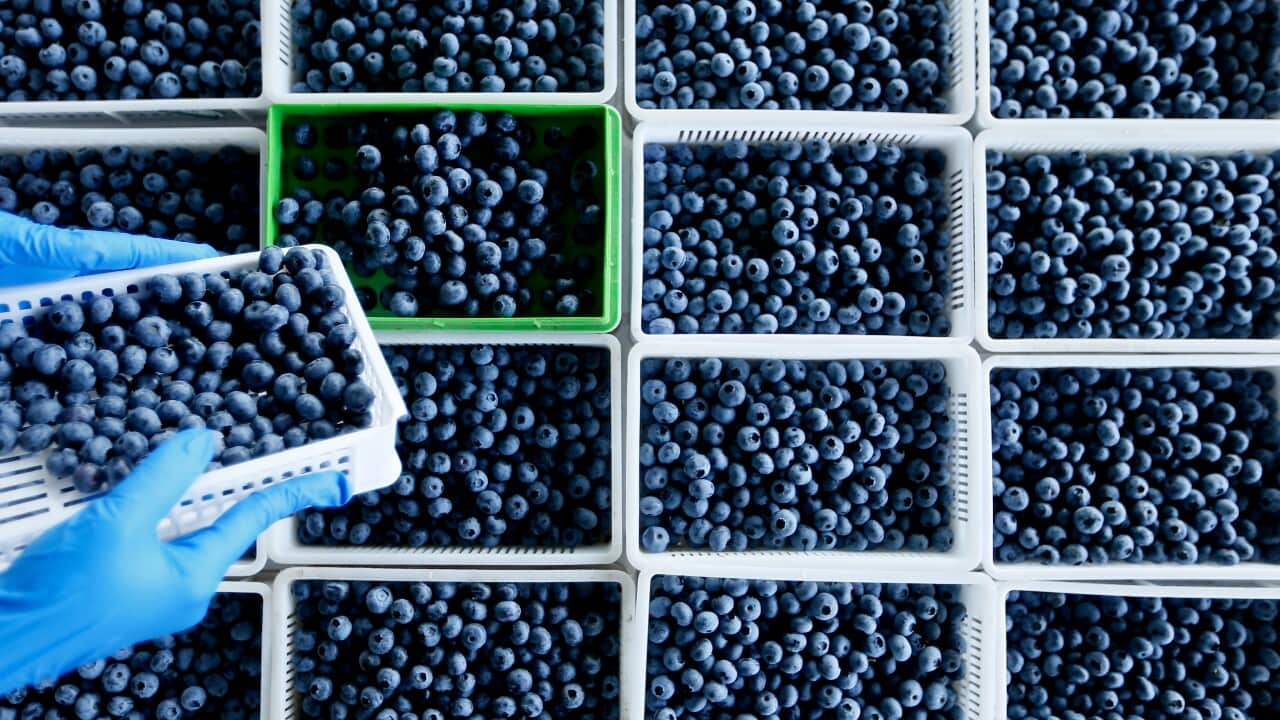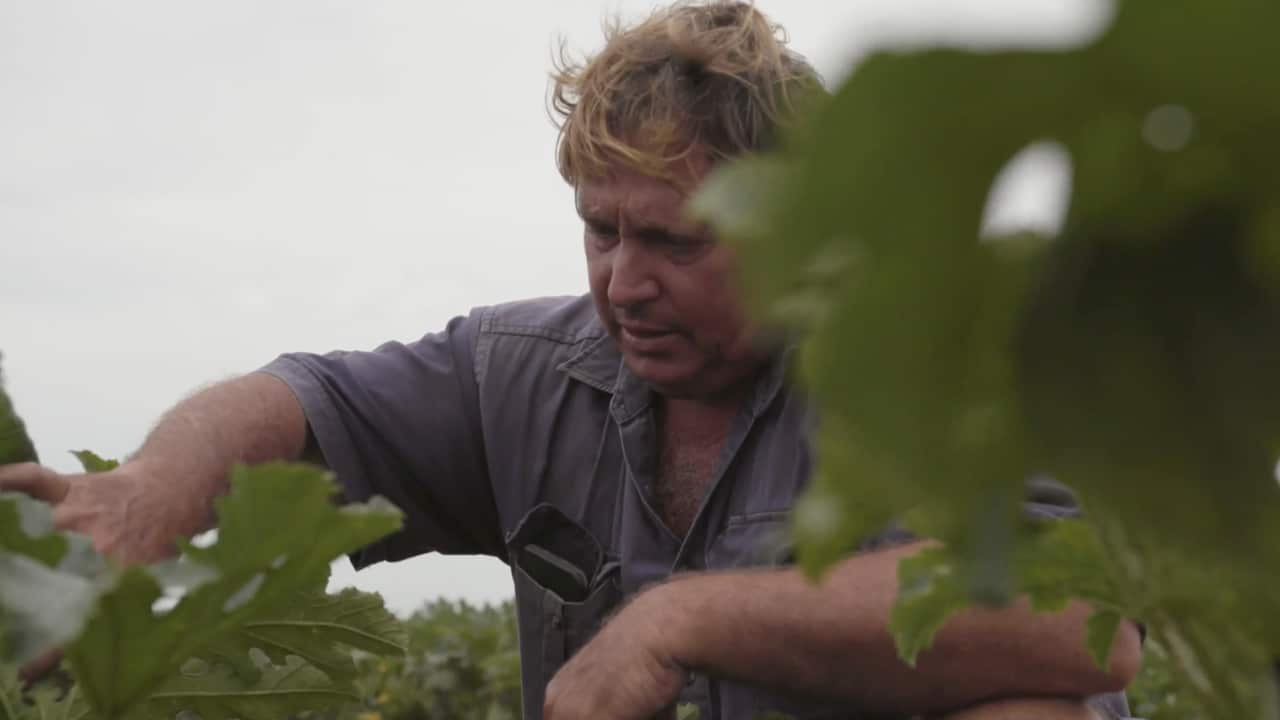Key points:
- An Australian researcher found high levels of a dangerous chemical in store-bought berries.
- A review by the pesticides regulator recommended a suspension of products containing the chemical.
- Consumers are advised to reduce their pesticide intake by washing or peeling vegetables.
Australia's agricultural chemicals regulator has proposed suspending the use of a pesticide on certain fruits after high levels of a harmful chemical were detected in store-bought blueberries.
When professor of marine science at Southern Cross University Kirsten Benkendorff tested blueberries and raspberries bought at Australian supermarkets last November, she found high levels of a pesticide banned in the EU, as well as amounts of another chemical not approved for use in Australia.
The Australian Pesticides and Veterinary Medicines Authority (APVMA) said it would take action immediately if evidence indicated that there was an imminent risk of harm to the Australian community.
But levels of banned chemicals have raised questions around pesticide regulation in Australia.
What happened?
Benkendorff had been testing creeks exposed to run-offs from blueberry crops, as well as crabs, oysters and turtles in the marine environment when the presence of a certain chemical raised suspicion.
"I was just really interested to see if it was getting into our food," she told SBS News.
After buying punnets of berries from three different supermarkets in NSW's south-east coast, Benkendorff brought them to her lab for testing, where she found high levels of dimethoate, a chemical considered a "possible human carcinogen" by the United States Environmental Protection Agency.
Dimethoate is a common neurotoxin that has been in use since the 50s, and is legal in Australia. The EU banned its use in 2019, with the European Food Safety Authority concluding its use posed a risk to consumers, operators and workers.
All of Benkendorff's samples contained between four and 11 different kinds of pesticides, which were all generally below the recommended limit.
But three samples contained dimethoate levels high enough to exceed the daily acceptable intake, if consumed every day.
How are pesticides regulated in Australia?
Pesticides are a fact of Australian agriculture, targeting aphids, fruit flies and weevils. But they also impact us.
The Australian Pesticides and Veterinary Medicines Authority (APVMA) is the regulatory body overseeing pesticides and chemicals in Australia.
It sets maximum chemical limits for pesticides used in crops, which include "generous safety margins" to ensure chemical residues in produce remain between 10 and 100 times below the point where there could be "measurable impact".
But for those safety mechanisms to be effective, consumption level data needs to be accurate.
In February this year, the APVMA received "updated consumption figures" for blueberries, raspberries and blackberries, which indicated consumption levels had increased between 285 and 962 per cent.
Previous data for berry consumption had not been provided since 1995. The APVMA said 2017 approval for dimethoate products was "based on the most recent evidence available at that point in time".
In March, the updated consumption figures prompted the APVMA to initiate a review of dimethoate, which resulted in its decision to propose a suspension of "certain dimethoate products" for use on blueberries, raspberries and blackberries.
The APVMA said the residue is unlikely to cause issues for humans but has proposed the suspension as a precautionary measure.
It said it was satisfied that all other approved uses of dimethoate were safe.
Benkendorff said she was "alarmed" about regulation of chemicals, especially with foods promoted as superfoods like berries.
"When you look at the maximum residue limits for a lot of pesticides set by the APVMA it's actually higher in berries than in other foods, and people's kids are eating punnets at a time, my colleagues are eating six punnets a week," she said.
Her research detected low levels of Thiometon, a toxic insecticide that has been banned in Australia since 2001, in six of 11 blueberry samples, and all raspberry samples.
Benkendorff suggested its presence was likely coming in as a contaminant in another product used on crops.
"When pesticides are first registered in Australia, the company has to provide a chemical analysis, but it's not independently tested," she said.
"If the industry wants to use pesticides, it should be demonstrating that food is clean or giving information on which pesticides are problematic.
"Any packaged food needs to be labelled with details of its chemicals and additives, but when it comes to our fresh food, there isn't any detail of what toxic chemicals might be in there."
Are your blueberries safe?
The APVMA said its evidence supports the safety of Australian blueberries.
When it comes to which fruits and vegetables have fewer pesticides than others, Australia lacks clear data. The United States' Environmental Working Group publishes its annual 'Dirty Dozen', listing the fruits and vegetables with the most pesticides.
The 2025 Dirty Dozen is crowned by spinach, followed by strawberries, kale, grapes and peaches. Blueberries are at number 11 on the list.
To help mitigate pesticide intake, Food Standards Australia New Zealand recommends washing or peeling produce, choosing organic or low-residue options, or varying your diet so that you're not consuming large quantities of the same chemicals.
Organic produce in Australia still contains pesticides, however the amounts Benkendorff found in her organic samples were significantly low.
While washing can remove some chemicals from fruit, it can't remove all. Benkendorff's tests were run on washed blueberries.
"Berries have a semi-permeable skin and the chemicals get in. Washing may help but I think it's important for the public to know my tests were done on washed berries," she said.
A 2024 study published in the American Chemical Society's journal Nano Letters found the best way to "effectively eliminate nearly all pesticide residues" from produce was by peeling, instead of washing.




